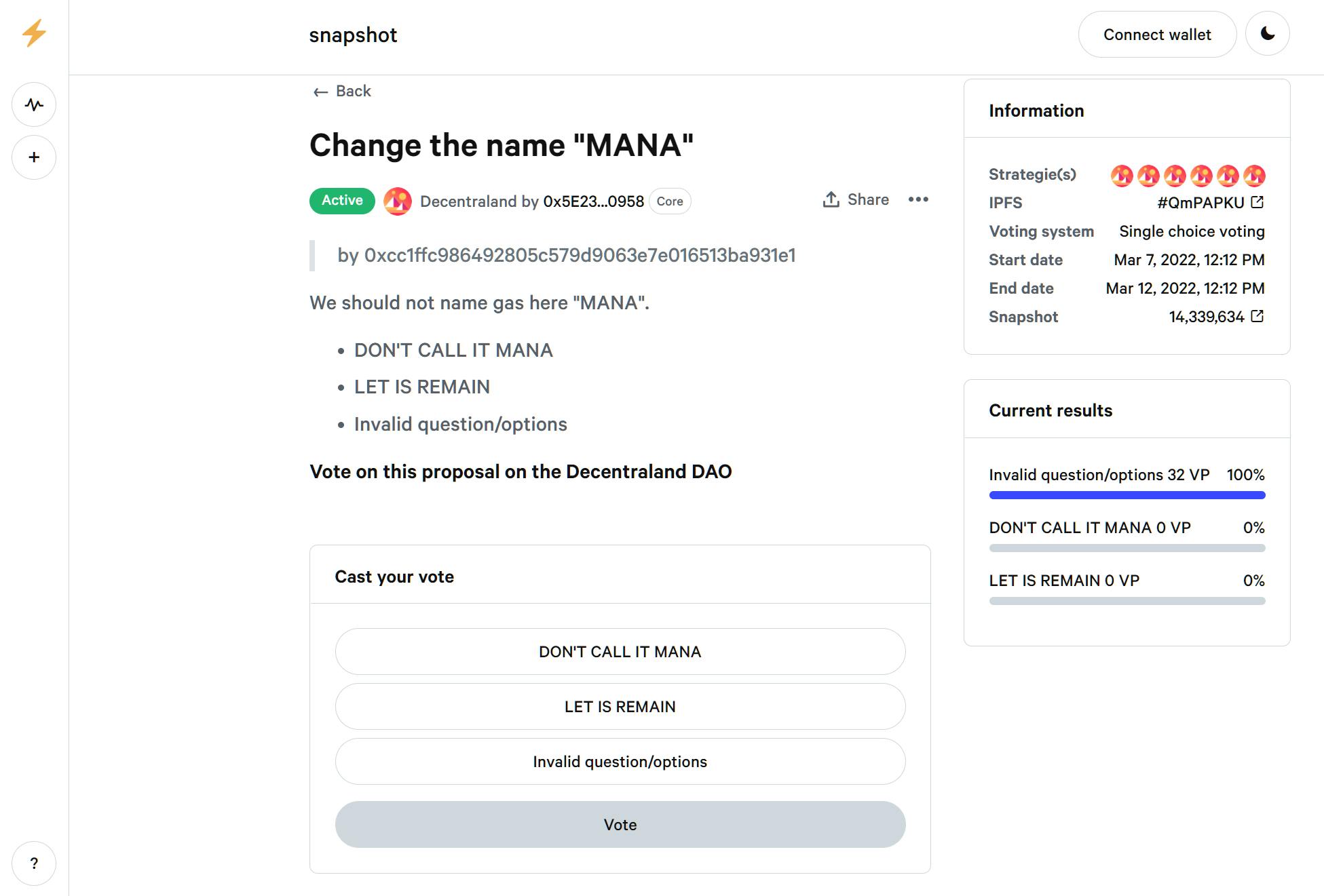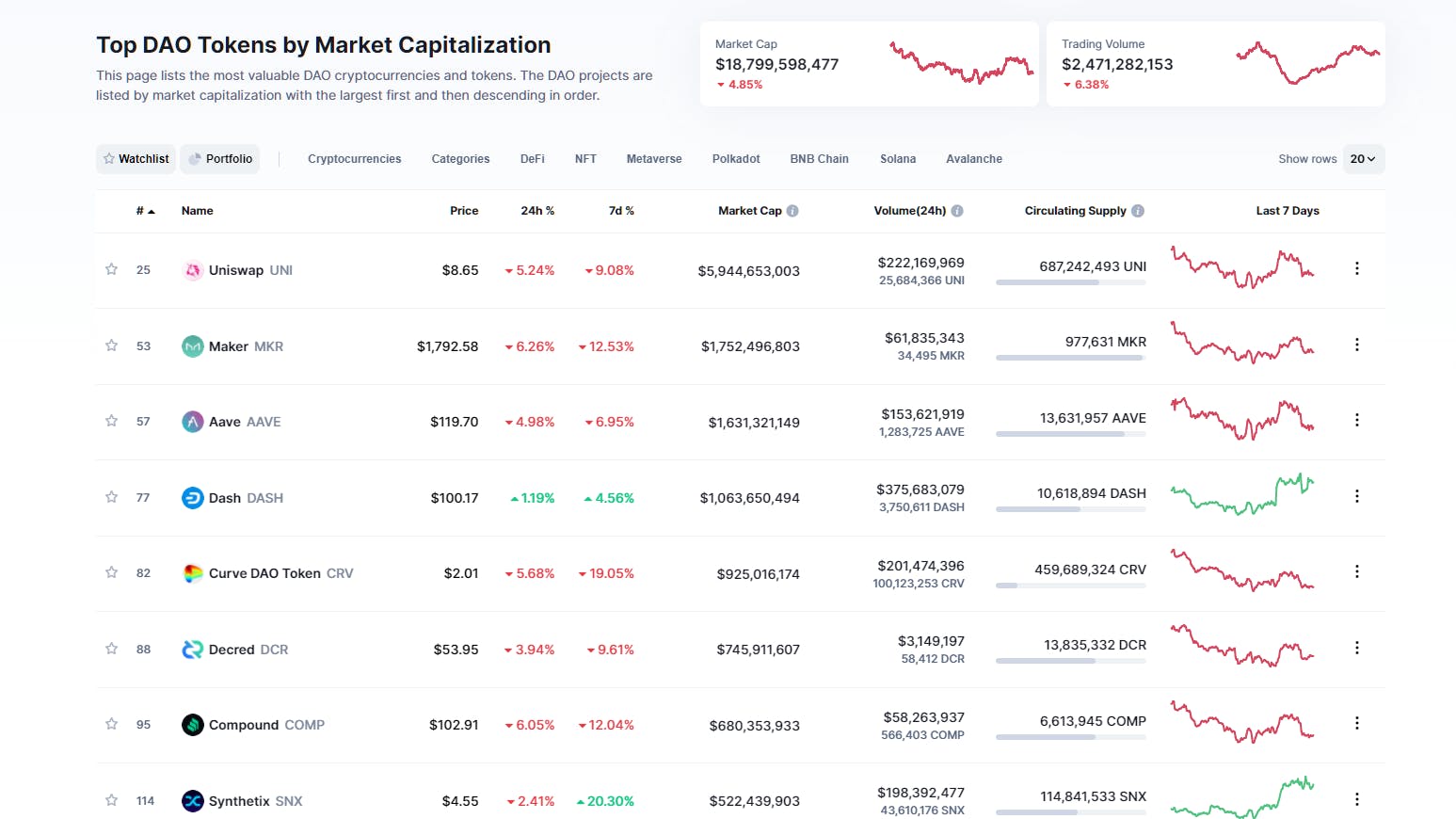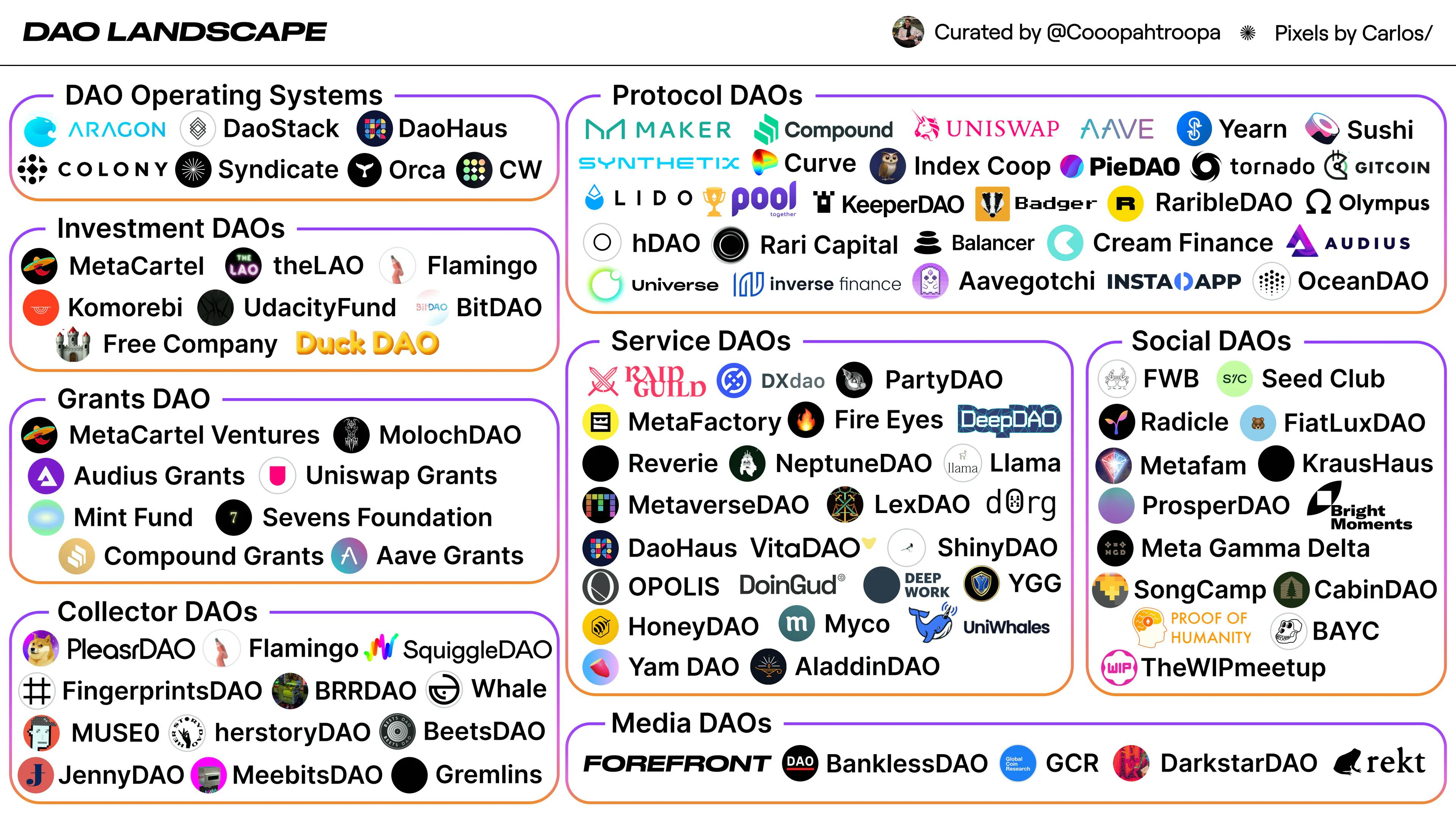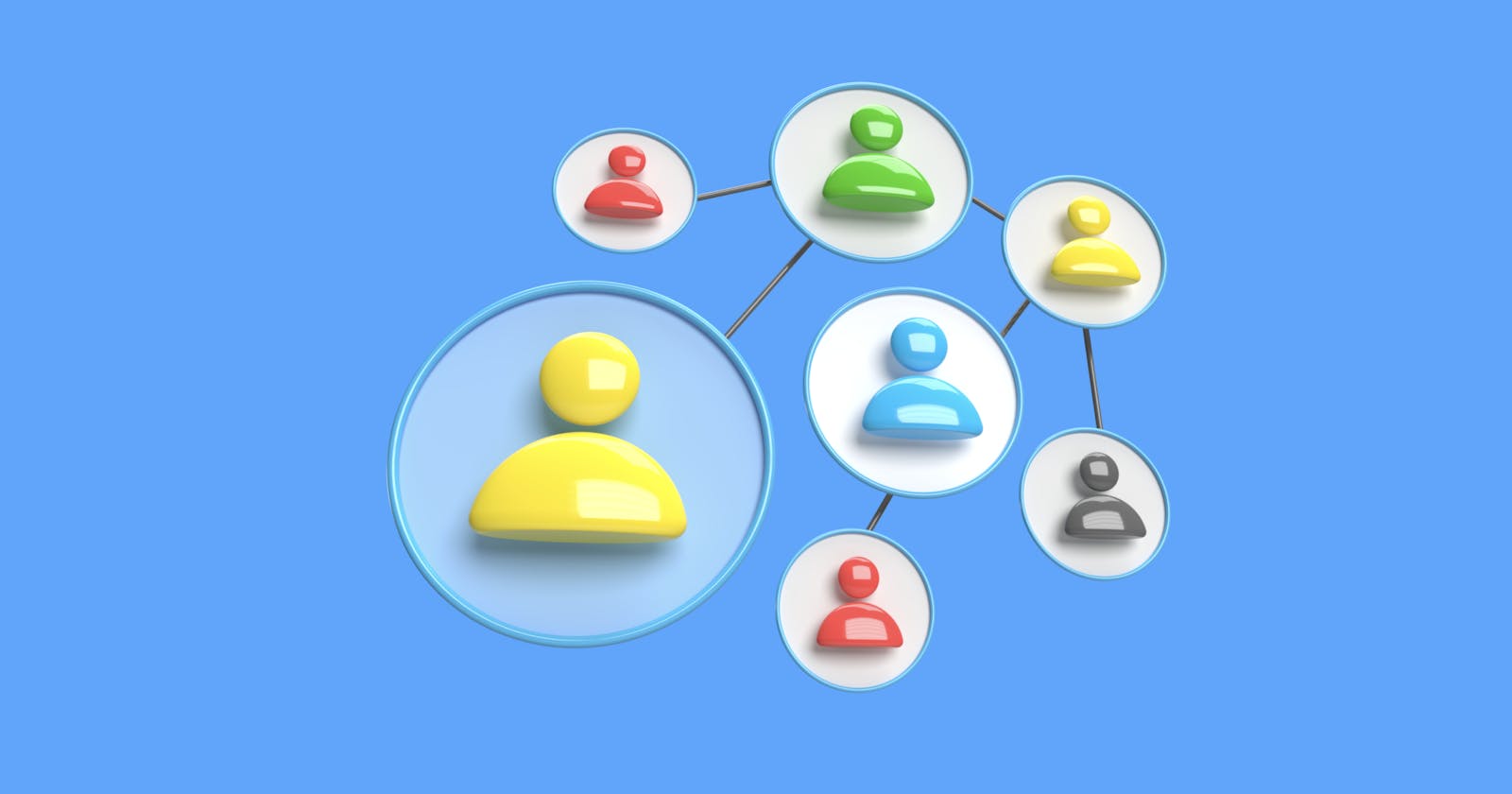Table of contents
- What does DAO stand for and how is it pronounced?
- What is a DAO? 🤔
- Do DAOs need humans at all? 🤖
- The three steps when creating a DAO
- How does a DAO work? ⚙
- How do I create a DAO proposal? ✍
- What can a DAO do?
- What was the first DAO?
- Pros 👍
- Cons 👎
- What is a DAO in Crypto?
- What is a DAO in NFTs? 🖼
- Why should I care about DAOs? 👨💼
Web3, cryptocurrencies, and NFTs are taking over the world.
The more they seep into the mainstream, the more Decentralized Autonomous Organizations (DAOs) will become important.
A key ethos in the crypto space is decentralization. Society has grown tired of the powerful keeping all the power to themselves.
Removing a central figure removes the opportunity for the misuse of power.
This is an issue that DAOs tackle.
So, more than ever, it's important to know…What is a DAO?
What does DAO stand for and how is it pronounced?
First off, DAO stands for Decentralized Autonomous Organization.
DAO is pronounced DA-OW.
What is a DAO? 🤔
A DAO is a way for a web3, crypto, or NFT project to organize itself without the need for a company or individual to be in power, resulting in a completely decentralized organization.
Instead of asking a CEO to make decisions, a DAO will ask its members to vote on what will happen.
Stakeholders will own a token which will be the equivalent of one vote. If 1000 tokens are released and you own one token, you will then have a proportional 1/1000 of the voting power.
A DAO removes the need for a human at the end of decisions. Once the vote is complete and the stakeholders have selected a winner, there is no CEO that clears the decision.
Instead, the DAO's smart contract will execute what it needs to do. Think of it as a refreshed, more democratic, digital-based way to run a company.
Do DAOs need humans at all? 🤖
A DAO needs humans to vote on proposals and, of course, it must be created by humans.
The developers who create it will set the parameters on which the DAO will begin to operate. These are things like the name, how many tokens will be released, etc.
Maybe the most important decision developers make, early on, is what voting mechanism the DAO will follow.
Currently, the most popular voting mechanism is token-based quorum voting. This requires a defined threshold of voters for a proposal to be passed (e.g. 70% of voting power must vote) then once the proposal is passed, the decision with the highest votes wins.
This is only one system of many, which is way beyond the scope of this article. But if you're a nerd like me and want to read more, check out Eric Arsenault's Medium article.
That being said, the DAO is not stuck the way the developers made it forever.
Stakeholders have the opportunity to vote on these issues and change them in the future. Once a DAO is fully up and running, the developers will have no power over the beast they created.
It's kind of like Frankenstein and his monster but hopefully less scary.
Some DAOs, however, are set up as a hybrid organization.
They will get stakeholders to bring forward and vote on proposals, but they may still have a group of developers or admins that have an element of control over what happens.
This makes the DAO less decentralized.

The three steps when creating a DAO
Generally, DAOs follow three steps when being created:
1. Developers create rules via smart contracts. The developers of the project will create the rules that the DAO will operate under. Such as the voting mechanism, etc.
2. Funding. Although the DAO will not need to pay a CEO, it will need funding in order to operate. This could be to pay freelancers to do work for the DAO, to donate to charities, or invest in projects the DAO wants to fund. The organization will need money, so funding will be required.
Often, this is done through auctioning the DAO's native cryptocurrency token.
3. Governance tokens influence the DAO. The holders of the DAO's tokens, also known as governance tokens, are now able to submit and vote on proposals. The DAO is now up and running.
How does a DAO work? ⚙
DAO stakeholders will submit a 'proposal' that every stakeholder has the opportunity to vote on. If the voting threshold is met and a winner emerges, the DAO will act upon the winning decision.
Anyone who is a stakeholder can create a proposal. Many projects handle their proposals on Snapshot.org. On this site, even as someone who isn't involved in the project, you can see proposals for some of the biggest DAOs in the crypto space.
For example, Decentraland's DAO proposals are dealt with on Snapshot. Once you select them from the home screen, you can see a list of active and closed proposals. One active proposal at the moment is voting to change the name of its token away from 'MANA'.

As you can see on the right, 100% of people have voted that it's an invalid question. Only 32 votes have been used for this option, so even if all 32 votes decided to change the name, it most likely wouldn't pass the threshold for the proposal to be accepted.
If you did want to vote, all you'd have to do is connect your wallet using the button in the top right. Then, find a proposal, select an option, and cast your vote. Oftentimes, it's free to vote on as well as create proposals, but some projects may require a small fee.
How do I create a DAO proposal? ✍
Want to create a proposal? Simply, click the 'new proposal' button on the left-hand side and write the proposal you want to create. Bear in mind that some projects will require you to own a certain amount of the token before creating a proposal (e.g. PancakeSwap requires you to own 10 CAKE in order to submit a proposal).
What can a DAO do?
A DAO can do pretty much anything that's proposed by the community, as long as it falls within the initial rules set by the developers.
Want some art commissioned? Vote on the DAO. Think a project should be funded? Vote on the DAO. More tokens should be minted? Vote on the DAO.
The possibilities are almost endless.
What a DAO can do and will do are two different questions. What the DAO will become is all up to the community.
What was the first DAO?
The first DAO was a venture capital fund simply called 'The DAO'. It was created by the German company Slock.it in 2016.
The DAO was built on the Ethereum blockchain as a way to raise money for their goal to connect the physical world with the blockchain. Using a similar model to Kickstarter or GoFundMe, Slock.it created The DAO which raised over $150 million worth of ETH — around 14% of the total amount of ETH in circulation at the time.
The DAO suffered one of the biggest hacks in cryptocurrency history in the summer of 2016, losing 3.6 million ETH (around 50 million USD). For years, the identity of the hacker was unknown. That was until, former Senior Editor of Forbes, Laura Shin, released an article, book, and podcast revealing who she and her sources believe to be behind the attack.
Shin alleges that Toby Hoenisch was the man behind one of the most notorious hacks in cryptocurrency history.
Pros 👍
Okay, so we know what a DAO is and how it works, but what are the benefits of using it over a regular business model?
1. Decentralization
Well, as we've echoed a thousand times already in this piece, it's decentralized. This means it's a trust-less model for consumers and investors. When using the product or investing your money into the project, you don't have to put your faith in a CEO, manager, or anyone in particular. You have to trust the community. A community you're part of.
2. Employee-owned
DAOs are essentially employee-owned organizations, meaning pay and quality of work-life can be prioritized.
In a regular business model, a CEO may reduce the pay and quality of work-life for their employees to increase the profits they make. In a DAO, employees can propose a wage increase that could be accepted — similar to trade unions.
3. Community driven
DAOs, just like many things in the crypto and NFT space, are community-driven. This means that the consumer can shape the project they love so much.
It also means that some innovative voices that, in other business structures, usually don't get the voice to speak can be heard. All it takes is a small number of tokens to submit a proposal.
Imagine if someone with a couple of Apple stocks tried to enter a board meeting with their idea for the new iPhone — no chance!
In a DAO, this is more than plausible.
4. Lack of government control
A DAO can't be shut down or strong-armed into revealing data by a government or regulatory body. With regular organizations, the government can force them to shut down or give them information on something or someone. This is not the case with DAOs.
The only way someone can have this kind of influence over a DAO is by holding such a large percentage of DAO tokens that they can force through a proposal. The chances of a government doing that are fairly slim.
5. Open-source
DAOs in crypto, web3, and the NFT space are open source. This means that the source code is freely available for the public to look at and improve upon. Community members can dive into the code, improve the DAO and submit a proposal to implement their improvements.
Open-source programs are seen as more reliable than closed-source software, as external programmers can find bugs that need to be patched up. It also adds a layer of trust as the public can verify that there are no dodgy functions designed to screw over the consumer.

Cons 👎
That being said, there are some DAOwnsides to using a DAO… sorry awful pun, anyways!
1. Possible attacks
One of them stems from the fact that they are open source. Sure, someone could find a bug and fix it. But what if they found a bug and exploited it? This is what happened with the first-ever DAO, resulting in the loss of 3.6 million ETH.
A hacker can use the open-source code to reverse engineer an attack and will be able to test the hack before executing it on the actual DAO.
2. Hard to keep secrets
Privacy becomes a bit of an issue in DAOs. Some organizations require company secrets to be far away from the public eye. However, a DAO requires most of the organization's information to be public — due to its open-source nature and stakeholders need to be informed. Imagine McDonald's recipe for the Big Mac sauce was open source (pardon the pun).
3. Not expert-driven
It's great that DAOs are community-driven, but in some cases, this can cause expert voices to be drowned out by the general public.
Organizations that rise to the top are usually pulled there by figures within the company that are ultra-intelligent pioneers in their space. In a DAO, if they don't hold enough influence over the voting power, their ideas could sink to the bottom.
This could be potentially fatal for an organization.
4. Slow reaction time
In DAOs, it's a bit harder to react quickly as an organization. Getting the required number of stakeholders to vote on an issue in a timely manner is hard, especially when a DAO starts to scale.
Your organization's stakeholders may not even be located in the same part of the world, which can result in the decision-making process to be much slower than usual.
5. No salaried workers
This could be sort of a pro...or sort of a con...Glass half-empty, or half-full, depending on how you see things. It's a bit difficult to categorize.
People who work for the DAO will often be contracted and paid on a project-to-project basis, meaning they could do one project then never work again. Unfortunately, this results in workers not getting any of the benefits that salaried workers do — such as health care, sick days etc.
However, this also means that the contractors have an opportunity to work for multiple DAOs, rather than be tied down to one project at a time.
The argument of being a salaried employee compared to working as a contracted freelancer is one that will be debated until the end of time. DAOs may be the catalyst for making freelancing more commonplace than ever before.
6. Not entirely decentralized
Sure, technically, there is no central figure that points in a direction, and everyone follows. But there could be a case where a small group of people hold most of the tokens required to push a proposal through. Or a DAO could be set up as a hybrid, with a group of people required to finalize decisions.
If this is the case, can we really say that a DAO is decentralized?
What is a DAO in Crypto?
DAOs are stored on cryptocurrency blockchains such as Ethereum. Holding a DAOs' native token will allow you to take part in governance and shape how the project moves forward.
The top DAO crypto tokens by market capitalization according to CoinMarketCap are:

Uniswap (UNI): Uniswap is the second biggest cryptocurrency decentralized exchange (DEX) on Ethereum.
Maker (MKR): MakerDAO is DeFi's largest lending platform.
Aave (AAVE): Aave is Ethereum's second-biggest lending protocol and the third-largest dApp.
Dash (DASH): Dash is focused on developing a network that offers quick, easy, and cheap global payments.
Curve DAO Token (CRV): Curve is a decentralized exchange (DEX) for stable coins. It uses an automated market maker (AMM) as a way to manage liquidity.
What is a DAO in NFTs? 🖼
This is where DAOs become particularly fun. NFT holders can have utility governance tokens airdropped to them so they can interact with the NFT's DAO. Meaning, the NFT is no longer just art but instead an invitation to be part of a community, organization, or charity.
One great example of an NFT DAO in play is the Dirt newsletter. This newsletter releases NFTs which act as a badge to wear proudly as someone who is backing the project. NFT holders are airdropped Dirt governance tokens which can be used to vote on what articles will be funded for the upcoming newsletter.
This removes the middle man of a publication that takes a fraction of the price, ensuring the writers can be paid as much as they deserve.
![Image of a Dirt DAO NFT. [In image] Dirt mascot writes in a dirty notebook with a worm on the window sill.](https://cdn.hashnode.com/res/hashnode/image/upload/v1646867489280/BRkNDVb91.png?auto=compress,format&format=webp)
DAOs have also been used to organize huge movements within the NFT community.
An example of this is the ApeDAO project. This DAO controls 81 Bored Ape Yacht Club (BAYC) and 81 Mutant Ape NFTs. The community votes on what they should buy, sell, or HODL, acting as an NFT whale but in DAO form.
Early into February 2022, the ApeDAO voted to list all of their assets for a minimum of 12,000 ETH — roughly 37.8 million USD at the time.
Why should I care about DAOs? 👨💼
We've walked you through what a DAO is, how they work, and what it means for the crypto, NFT and web3 spaces. But why should you really care about DAOs?
DAOs are not just going to be a big part of the future, they are playing a big part in the online world right now. Below, you can see an image showing the huge number of DAOs currently operating in a range of industries.

From media companies to operating systems to crypto exchanges, DAOs are running the web3 space. Just like most things on the blockchain, the mainstream is behind. But they'll catch up someday soon. When that happens, now that you've read this article, you'll be ready to explain what a DAO is to your parents, grandparents, and dog.
To summarize, a DAO allows for stakeholders of a project to make decisions of how it should allocate its funds, change, and evolve through a thing called a proposal.
To learn more about web3, DAOs, NFTs, and the blockchain check out Hashnode’s web3 blog.

